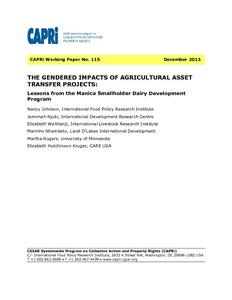Focal point
Location
About IFPRI
The International Food Policy Research Institute (IFPRI) provides research-based policy solutions to sustainably reduce poverty and end hunger and malnutrition in developing countries. Established in 1975, IFPRI currently has more than 500 employees working in over 50 countries. It is a research center of theCGIAR Consortium, a worldwide partnership engaged in agricultural research for development.
Vision and Mission
IFPRI’s vision is a world free of hunger and malnutrition. Its mission is to provide research-based policy solutions that sustainably reduce poverty and end hunger and malnutrition.
What We Do
Research at IFPRI focuses on six strategic areas:
- Ensuring Sustainable Food Production: IFPRI’s research analyzes options for policies, institutions, innovations, and technologies that can advance sustainable food production in a context of resource scarcity, threats to biodiversity, and climate change. READ MORE
- Promoting Healthy Food Systems: IFPRI examines how to improve diet quality and nutrition for the poor, focusing particularly on women and children, and works to create synergies among the three vital components of the food system: agriculture, health, and nutrition. READ MORE
- Improving Markets and Trade: IFPRI’s research focuses on strengthening markets and correcting market failures to enhance the benefits from market participation for small-scale farmers. READ MORE
- Transforming Agriculture: The aim of IFPRI’s research in this area is to improve development strategies to ensure broad-based rural growth and to accelerate the transformation from low-income, rural, agriculture-based economies to high-income, more urbanized, and industrial service-based ones. READ MORE
- Building Resilience: IFPRI’s research explores the causes and impacts of environmental, political, and economic shocks that can affect food security, nutrition, health, and well-being and evaluates interventions designed to enhance resilience at various levels. READ MORE
- Strengthening Institutions and Governance: IFPRI’s research on institutions centers on collective action in management of natural resources and farmer organizations. Its governance-focused research examines the political economy of agricultural policymaking, the degree of state capacity and political will required for achieving economic transformation, and the impacts of different governance arrangements.
Research on gender cuts across all six areas, because understanding the relationships between women and men can illuminate the pathway to sustainable and inclusive economic development.
IFPRI also leads two CGIAR Research Programs (CRPs): Policies, Institutions, and Markets (PIM) andAgriculture for Nutrition and Health (A4NH).
Beyond research, IFPRI’s work includes partnerships, communications, and capacity strengthening. The Institute collaborates with development implementers, public institutions, the private sector, farmers’ organizations, and other partners around the world.
Resources
Displaying 396 - 400 of 15212013 Welthunger-Index : Herausforderung Hunger : Widerstandsfähigkeit stärken Ernährung sichern
Der Bericht zum Welthunger-Index 2013 – der achte in einer jährlich erscheinenden Serie – stellt die Entwicklung des weltweiten, regionalen und nationalen Hungers mittels eines mehrdimensionalen Indexwertes dar. Er zeigt, dass die Weltgemeinschaft bei der Bekämpfung des Hungers seit 1990 gewisse Fortschritte gemacht hat, dass aber noch viel zu tun ist.
2013 Global hunger index : The challenge of hunger : Building resilience to achieve food and nutrition security
The 2013 Global Hunger Index (GHI) report-the eighth in an annual series- presents a multidimensional measure of national, regional, and global hunger. It shows that the world has made some progress in reducing hunger since 1990, but still has far to go. The 2013 GHI report focuses on resilience in theory and in practice. The relief and development communities have long struggled to understand why some people fare better than others when confronting stresses or shocks.
Methodology [In East African agriculture and climate change]
Why did Mozambique’s public extension halt the implementation of the National Agrarian Extension Program (PRONEA)?
Agriculture plays a crucial role in food security and poverty reduction in Mozambique, contributing around 25 percent of the country’s Gross Domestic Product (GDP). However, despite the considerable agro-ecological potential and the need for increased production, agricultural productivity remains low. The prevailing gap between domestic food production and demand, as well as lagging exports, continue to pose significant challenges.







